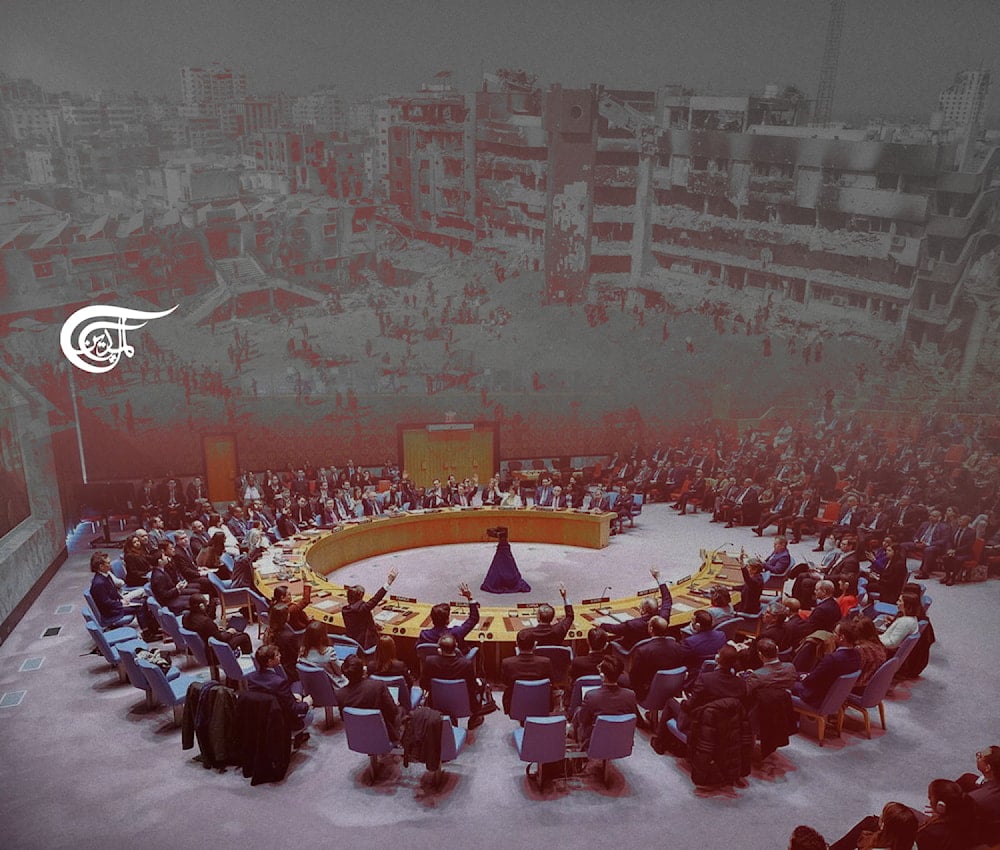UNSC Ceasefire Resolution 2728 is in Place: Where is its Implementation?
A punitive resolution imposing sanctions on "Israel" will not be supported by the Biden administration, rendering the prospect of accountability for genocide elusive.
-

The American and Israeli claims lack credibility but also point at how the resolution may not alleviate the suffering of the Palestinians (Illustrated by Mahdi Rteil to Al Mayadeen English)
Despite the passage of UNSC Resolution 2728 calling for an immediate ceasefire in Gaza, "Israel's" fascist war machinery continues to wreak havoc on Palestinians through the weaponization of starvation, bombardment of hospitals, killing of aid workers, and arresting worshippers in the holy month of Ramadan at the Al Aqsa Mosque. The far-right, irredentist Netanyahu regime is adamant that ethnic cleansing of Palestinians should continue unabated which explains "Israel" brazenly ignoring the resolution and its central tenets. The question then, arises- how impactful would Resolution 2728 be in terms of yielding tangible results? Can such measures hold a genocidal regime to account?
There is reason for pessimism. Whether it is the International Court of Justice ruling or international pressure on Netanyahu to rescind his regime’s senseless killing spree, "Israel" has conveniently rebuffed any prospect of an end to hostilities that is solely perpetrated by its occupation forces against a battered population. It is hence, worthwhile to examine whether the implications of resolution 2728 would be any different and whether its violation could result in action. The resolution makes three demands- One, an immediate ceasefire in the month of Ramadan respected by all parties leading to a lasting, sustainable ceasefire. Two- the immediate and unconditional release of all hostages; Three- urgently expanding the flow of humanitarian assistance to reinforce the protection of the civilians in the Gaza strip. Tabled by ten non-permanent members of the UNSC and passed unanimously by 14-0 with the United States abstaining, its impact so far has been limited.
None of the three conditions have been met by "Israel". Bombardments and massacres continue in the holy month of Ramadan, while aid workers are targeted and a hostage deal remains elusive due to hubris from the Netanyahu regime. While it is true that the resolution was passed due to the United States abstaining, and it is considered binding despite American claims to the contrary, it has not resulted in "Israel" mitigating violence or creating the necessary conditions for a ceasefire to take place. For example, Netanyahu has been categorical in stating that the calls for a ceasefire are not contingent on the release of hostages, despite the resolution stating the contrary. Further rebuttals came from US State Department spokesperson Matthew Miller, who referred to it as ‘non-binding’ and clarified that it does not impose obligatory sanctions and actual requirements on people.
The American and Israeli claims lack credibility but also point at how the resolution may not alleviate the suffering of the Palestinians. According to the President of the Center for International Policy in the United States, Nancy Okail, the resolution is more symbolic rather than substantial in its ability to end the war. Okail’s claims come despite the fact that the UNSC resolutions are considered binding as previously emphasized by Chinese Ambassador to the UN, Zhang Jun, and Deputy UN Spokesperson Farhan Haq. Such academic and scholarly skepticism of the resolution’s potential impact however exists despite the fact that Israeli violations can result in a follow-up resolution from the council which addresses the breach and calls for punitive action in the form of sanctions and the authorization of international intervention.
Here lies the catch, however. A punitive resolution imposing sanctions on "Israel" will not be supported by the Biden administration, rendering the prospect of accountability for genocide elusive. Realpolitik sets in, despite institutions seeking to abide by norms, customs and values enshrined in international law. Such realpolitik allows "Israel" to continue with the status quo given American support which has remained unwavering and ironclad despite recently abstaining from the UNSC vote. "Israel" has also previously gotten away with flouting UN resolutions in the past which includes the UNSC calling Israeli settlements on Palestinian lands illegal, (which was passed with 14 votes and the United States abstaining) and in 2023, when the UNGA passed a non-binding resolution calling for a humanitarian ceasefire which "Israel" also ignored.
What UN resolutions need to address is the genesis of the issue which is the nature of the Israeli state and its expansionist agenda. There is no letup in settlements on occupied land for example with new plans afoot in the West Bank. There are also calls and actions aimed at eliminationism by far-right demagogues ranging from Bezalel Smotrich to Itamar Ben Gvir. There is also no let up in arms supplies from the United States to "Israel" which is providing ammunition to the genocidal regime amid resisting calls of international accountability. All this comes with a failure to address forced displacement, sexual assault, apartheid and evictions that Palestinians face on a daily basis.
While the UNSC resolution 2728 is a promising development, its implementation will be stymied by Israeli adamancy in maintaining the status quo, unwavering American support, and the genocidal nature of the Netanyahu regime.

 Hamzah Rifaat
Hamzah Rifaat
 5 Min Read
5 Min Read











